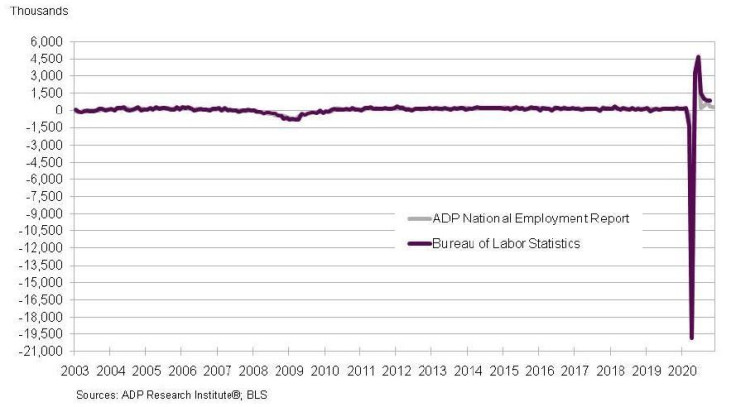More Than 300,000 Jobs Added In November, Short Of Expectations
KEY POINTS
- ADP data missed expectations by at least 100,000 jobs
- Medium-sized firms saw the most hires last month
- Federal jobs data will release on Friday
Private payroll processor ADP on Wednesday reporting hiring increased in November, boosted by the services sector, but new hires were less than expected.
ADP reported private sector employment last month increased by 307,000 from October. Estimates from the Reuters news service put the figure closer to 410,000 while the Washington Post cited expectations of 475,000 new jobs last month.
“While November saw employment gains, the pace continues to slow,” Ahu Yildirmaz, vice president and co-head of the ADP Research Institute, said in a statement.
Medium-sized companies, those with between 50 and 499 employees, contributed to most of the gains, with 139,000 new hires last month. By segment, it was the services sector that saw the most hires, with a net total of 276,000 in November. That includes some 95,000 jobs in the leisure and hospitality industry, an economic segment hit hard by social restrictions enacted during the pandemic.
Only the information sector, which includes IT, saw static growth from October to November.
“Job growth remained positive across all industries and sizes,” Yildirmaz said.
By comparison, however, ADP reported 405,000 new hires from September to October and 754,000 from August to September. While part-time jobs in the retail sector could boost numbers this month, social restrictions across many states could see layoffs in the leisure and hospital segment as many restaurant workers return to the unemployment line.
APD trends are more or less in line with that reported by the Bureau of Labor Statistics, which has yet to publish unemployment figures for November.

The disappointing results come as lawmakers continue to spar over another round of stimulus. The CARES Act, passed in March, delivered $1,200 checks and supplemented state unemployment insurance payments by $600. That support has long since expired.
On Tuesday, one day after urging Congress to pass a “major” aid package, Senate Majority Leader Mitch McConnell shot down the latest stimulus proposal. That triggered frustration from some of the more moderate members within his own party.
McConnell’s refusal was “offensive,” said Sen. Lisa Murkowski of Alaska. She called on colleagues to move forward with a bipartisan $908 billion package, rather than the majority leader’s proposal that includes an estimated $300 billion for small businesses but excludes another round of $1,200 checks to American taxpayers.
ADP’s figures are subject to revision. Federal data on unemployment are published Friday.

© Copyright IBTimes 2025. All rights reserved.





















